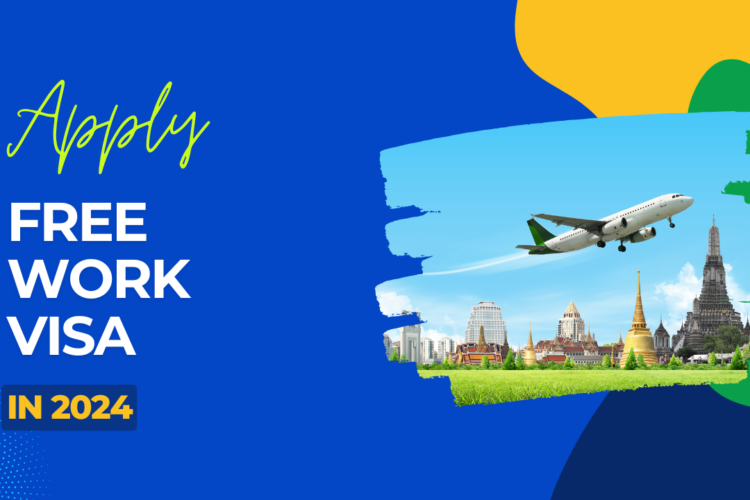As the global job market continues to evolve, Europe remains a popular destination for professionals seeking new opportunities. For those looking to work in Europe without the financial burden of visa fees, understanding the application process for a free work visa is essential. In 2024, several countries offer pathways that allow foreigners to work legally while minimizing costs. This article will guide you through the steps, requirements, and best practices for applying for a free work visa in Europe.
Understanding the Free Work Visa Concept
A “free work visa” typically refers to visa categories that either have reduced fees or are waived entirely, particularly for certain nationalities, job sectors, or under specific agreements. Some European countries aim to attract skilled workers by offering such options. Its crucial to note that each country has its own regulations, so thorough research is necessary.
Popular European Destinations Offering Free or Low-Cost Work Visas
- Germany
- EU Blue Card: Aimed at skilled workers, the EU Blue Card has low application fees for certain professionals, especially in IT, engineering, and healthcare.
- Job Seeker Visa: This visa allows you to enter Germany for six months to find employment without upfront costs.
- Sweden
- Work Permit: While typically associated with fees, Sweden offers waivers for certain job categories, particularly in tech and healthcare.
- Portugal
- D7 Visa: This is designed for retirees and those with passive income but has become popular for remote workers and freelancers with no significant fees.
- Estonia
- Digital Nomad Visa: This innovative visa allows remote workers to live and work in Estonia for up to a year without hefty application costs.
- Austria
- Red-White-Red Card: This work permit has low fees and aims to attract skilled workers, especially in sectors facing shortages.
Key Eligibility Criteria
Regardless of the specific visa, applicants generally need to meet certain criteria:
- Job Offer: Most work visas require a confirmed job offer from a company in the host country.
- Qualifications: Educational and professional qualifications related to the job offered are usually assessed.
- Language Proficiency: Some countries may require proof of proficiency in the local language or English, especially in roles that involve customer interaction.
- Financial Stability: You may need to show proof that you can support yourself during your stay.
- Health Insurance: A valid health insurance plan is often required to cover potential medical expenses.
Steps to Apply for a Free Work Visa in Europe
1. Research Your Destination
Begin by identifying which European country aligns with your career goals. Look into the specific work visa options available, eligibility criteria, and any associated costs.
2. Obtain a Job Offer
Securing a job offer is often a prerequisite for applying for a work visa. Use platforms like LinkedIn, Indeed, or specialized job boards relevant to your field. Networking can also be invaluable; attend job fairs or connect with professionals in your desired industry.
3. Prepare Required Documentation
Gather all necessary documentation, which typically includes:
- Passport: Valid for at least six months beyond your intended stay.
- Job Offer Letter: A formal letter from your employer detailing your position, salary, and duration of employment.
- Qualifications: Diplomas, certificates, and transcripts.
- Language Proficiency Evidence: Certificates from recognized language tests, if required.
- Financial Proof: Bank statements or employment contracts demonstrating your financial stability.
- Health Insurance: Proof of coverage that meets the host countrys requirements.
4. Submit Your Application
The application process varies by country:
- Online Applications: Many countries offer online portals where you can submit your application and pay any necessary fees (if applicable).
- Embassy/Consulate Submission: Some countries may require you to submit your application in person at their embassy or consulate.
5. Attend an Interview
Depending on the visa type and country, you may need to attend an interview as part of the application process. Prepare for questions about your job offer, qualifications, and plans in the host country.
6. Wait for a Decision
Processing times can vary significantly, from a few weeks to several months. Be patient and monitor your application status online if the option is available.
7. Plan Your Move
Once your visa is approved, you can start planning your relocation. Consider accommodation, transportation, and integrating into your new workplace and community.
Tips for a Successful Application
- Be Thorough: Ensure all documentation is complete and accurate to avoid delays.
- Follow Instructions: Each country may have specific application procedures; closely follow guidelines to ensure compliance.
- Use Professional Networks: Join expat communities or professional organizations related to your field to gain insights and support.
- Stay Updated: Visa policies can change, so regularly check the official immigration websites of your chosen country for any updates.
- Consider Local Help: If the process feels overwhelming, consider hiring an immigration consultant familiar with the countrys requirements.
Challenges You Might Face
While applying for a free work visa can be advantageous, challenges may arise:
- Complicated Regulations: Immigration laws can be intricate; missteps in your application could lead to delays or rejections.
- Job Market Competition: Some countries have a saturated job market, making it difficult to secure a position.
- Cultural Adjustment: Adapting to a new country involves more than just work; understanding local customs and practices is crucial for successful integration.
